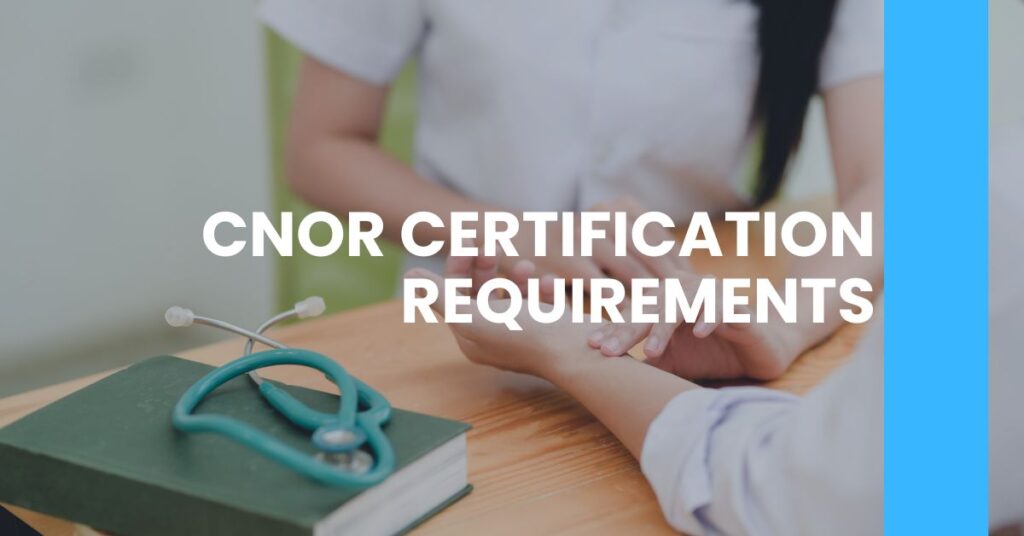Unlock the keys to CNOR Certification Requirements with our expert tips and succinct outline.
- Eligibility Criteria: Pin down the essential qualifications you’ll need to start your CNOR journey.
- Preparation Resources: Leverage the best study materials and resources aimed at bolstering your success.
- Exam Overview: Get a clear snapshot of the CNOR exam format and content to strategize your study plan.
Master the CNOR Certification Requirements to elevate your nursing career.
- Understanding CNOR Certification
- Eligibility Criteria for CNOR Certification
- Preparing for the CNOR Exam: Study Materials and Resources
- The CNOR Exam Structure and Content Areas
- The Application Process for the CNOR Exam
- Fees and Costs Associated with CNOR Certification
- CNOR Exam Preparation Strategies
- Maintaining and Renewing Your CNOR Certification
- The Benefits of Achieving CNOR Certification
- Additional Resources and Support for CNOR Candidates
- Conclusion: The Value of CNOR Certification in Your Nursing Career
Understanding CNOR Certification
Certified Nurse Operating Room (CNOR) certification represents a distinguished mark of professional achievement for perioperative nurses. This credential is not only a symbol of your dedication but also reflects a commitment to patient safety and the highest standards of care in the operating room.
What Does CNOR Stand for?
- CNOR: This is an acronym for ‘Certified Nurse Operating Room’, a certification specifically for nurses who work in the perioperative environment.
Why Pursue CNOR Certification?
Achieving CNOR certification can significantly enhance your nursing career. It demonstrates mastery of a broad set of skills and specialized knowledge in perioperative nursing, which in turn can:
- Open the door to various career opportunities
- Potentially increase your earning potential
- Validate your commitment to excellence in patient care
Who is Eligible for CNOR Certification?
If you’re considering CNOR certification, you must meet specific eligibility requirements, which include:
- Active RN License: You must have an unrestricted RN license to qualify.
- Perioperative Experience: A minimum of two years and 2,400 hours of perioperative nursing experience, with at least half of that time spent in the intraoperative setting, is required.
Eligibility Criteria for CNOR Certification
Before you dive into the process of obtaining your CNOR certification, let’s clarify what exactly the eligibility requirements entail.
Educational Background
- Registered Nurse: A degree in nursing is mandatory, with an active RN license in good standing.
Experience in Perioperative Nursing
- Practical Experience: You need at least 2,400 hours of perioperative nursing experience, where a significant portion has been in an intraoperative role.
Active Licensure
- Unrestricted License: Your RN license should be current and without any encumbrances or limitations.
Preparing for the CNOR Exam: Study Materials and Resources
Beginning your journey to CNOR certification can be overwhelming but arming yourself with the right resources can make all the difference.
Recommended Study Materials
Equip yourself with comprehensive study tools that cater to various learning styles:
- Guidelines for Perioperative Practice
- Practice Questions: Free practice questions offered by organizations like AORN can be instrumental.
- Review Courses: Engage in review courses, both online and live, offered by AORN.
Additional Resources
- Study Groups: Collaborate with peers.
- Professional Journals: Stay current with the latest research and best practices.
The CNOR Exam Structure and Content Areas
Walking into your CNOR exam with a clear understanding of what lies ahead can significantly boost your confidence.
Exam Format and Duration
- Multiple-choice Questions: The exam consists of 200 questions to be completed within a specified time frame.
Key Content Areas
The CNOR exam comprehensively covers various areas crucial to perioperative nursing. Some of the main areas include:
- Communication and Documentation: The cornerstone of effective perioperative management.
- Infection Prevention and Control: Critical in maintaining patient safety.
- Instrumentation and Supplies: Understanding the tools of the trade is essential.
The Application Process for the CNOR Exam
Applying for the CNOR exam might seem daunting, but it’s actually a straightforward process.
Steps to Apply
Here’s how you can navigate through the application process:
- Verify Eligibility: Ensure you meet all the eligibility criteria.
- Gather Documentation: Prepare documentation regarding your experience and RN license.
- Complete the Application: Fill out the application form diligently, double-checking all entries.
Submission and Deadlines
- Application Deadlines: Submit your application by the given deadlines to avoid any last-minute hitches.
After You Apply
Once you’ve applied, take the time to:
- Confirm receipt of your application
- Begin your study and preparation in earnest
Fees and Costs Associated with CNOR Certification
Understanding the financial investment required for CNOR certification is crucial for every aspirant. Like any professional credentialing process, CNOR certification comes with associated costs that you should plan for ahead of time.
CNOR Exam Fees
- Initial Exam Fee: The cost to take the CNOR exam is currently set at $445.
- Take 2 Program: For added peace of mind, the CNOR Take 2 program allows a second attempt at the certification exam within a 12-month period, should your first try be unsuccessful. This option is priced at $495.
Preparing Your Budget
When budgeting for your CNOR certification, consider additional costs beyond the exam fee:
- Study Materials: Books and courses come with their own price tags.
- Retake Fees: In case you need another attempt beyond the Take 2 program, factor in those costs.
It’s important to view these costs as an investment in your professional development. CNOR certification can open doors to higher-paying roles, which means the certification can pay for itself over time.
CNOR Exam Preparation Strategies
Preparing for the CNOR exam requires a personalized strategy that fits your schedule, learning preferences, and life commitments. There’s no one-size-fits-all approach, but there are tried-and-tested strategies that have helped many nurses succeed.
Creating a Study Plan
- Set Realistic Goals: Establish what you can accomplish daily, and don’t overextend yourself.
- Use a Planner: Organize your study times and stick to them. Consistency is key.
Managing Time Effectively
- Prioritize Weak Areas: Focus on subjects that are challenging for you.
- Review Regularly: Regular review sessions can greatly improve your retention of information.
Stress Management Techniques
- Take Breaks: Give yourself short breaks to avoid burnout.
- Practice Self-Care: Exercise, nutrition, and sleep are vital for keeping stress at bay.
Remember, success on the CNOR exam is not just about hard work, but also about working smart. Find a balance that allows you to prepare effectively without sacrificing your wellbeing.
Maintaining and Renewing Your CNOR Certification
Achieving your CNOR certification is a milestone, but maintaining it ensures you stay at the forefront of perioperative nursing standards. The ongoing requirement for professional development reflects the dynamic nature of the healthcare field.
Continuing Education
- Contact Hours Required: You must obtain at least 75 contact hours of approved continuing education to maintain your CNOR certification.
- Relevancy: Choose courses and activities that are relevant to the perioperative field to fulfill your credits.
Recertification Cycle
- Every Five Years: Recertification is required every five years, reinforcing the need for continuous professional improvement.
- Documenting Your Experience: You’ll need to log at least 2,400 hours of perioperative practice over the recertification cycle.
Recertification is your commitment to professional excellence, ensuring that you remain knowledgeable and skilled in an ever-evolving healthcare environment.
The Benefits of Achieving CNOR Certification
As a perioperative nurse, one of the most significant steps you can take in your career development is to achieve CNOR certification. This prestigious credential goes far beyond a mere addition to your resume.
Career Advancement
- Higher Salaries: CNOR-certified nurses often have access to higher wages and advanced job positions.
- Marketability: This certification can make you more attractive to employers looking for proven expertise.
Patient Care
- Improved Outcomes: Certified nurses are equipped with the latest knowledge, which can translate into better patient care.
Institutional Recognition
- Quality Indicators: Hospitals with certified nurses can demonstrate a commitment to excellence, which may inform patient choices and enhance the institution’s reputation.
Obtaining CNOR certification reaffirms your dedication not just to personal growth, but to the broader mission of health care—to ensure safe and effective patient care.
Additional Resources and Support for CNOR Candidates
While the journey to CNOR certification requires commitment, you don’t have to embark on it alone. There is a wealth of resources and support systems designed to help you navigate the complexities of the CNOR certification requirements.
Online Communities
- Discussion Forums: Engage with peers on platforms such as AllNurses or The OR Today forum. Share experiences, tips, and encouragement.
- Social Media Groups: Join groups on Facebook or LinkedIn where CNOR aspirants and certified nurses collaborate and share resources.
Professional Organizations
- AORN: The Association of periOperative Registered Nurses provides comprehensive resources for CNOR prep.
- CCI: The Competency and Credentialing Institute offers critical information, including eligibility details and exam preparation materials.
As you leverage these valuable resources, you’ll find that you’re part of a community committed to excellence in perioperative nursing.
Conclusion: The Value of CNOR Certification in Your Nursing Career
In closing, pursuing and achieving CNOR certification is not a mere formality—it’s an empowering process that enhances your professional aptitude, credibility, and commitment to the highest standards in perioperative care. Whether you’re seeking recognition for your expertise, aiming for career growth, or looking to improve patient outcomes, CNOR certification is a significant credential that asserts your prominence in the field of nursing.
While meeting the CNOR certification requirements may seem daunting at first, remember that it is a path tread by many successful perioperative nurses before you. With each step of the journey, from understanding the eligibility criteria to maintaining your credential, you become a part of an elite group that has dedicated themselves to excellence in surgical care. As you invest in your future with CNOR certification, you’re not just advancing your career—you’re elevating the standard of care for patients worldwide.

